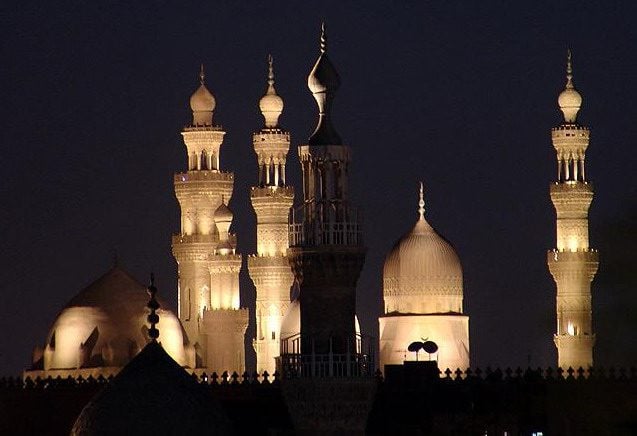
(Wikimedia Commons public domain image)
As we saw in the last chapter, one of the major themes of the Qur’an is the Day of Judgment, when the Lord will come with his angels.[1] On that day, which will be announced by a trumpet, there will be a new heaven and a new earth. In terms very similar to those of the Bible, the Qur’an says that great earthquakes will accompany that terrible day. Even the mountains, the most solid thing in the physical world to ancient peoples, will be in motion, which will contribute to a general sense of unease, perhaps even like physical seasickness but much worse, among the people. The sky will split open, heaven will be “stripped off,” rolled up like a parchment scroll. The sun will cease to shine, the stars will be scattered and fall down upon the earth. The oceans will boil over. The graves will be opened up, with the earth bringing forth its burdens—the hidden sins, the lost stories, the dead. Men will vainly seek to flee from God’s wrath.[2]
The unbeliever will cry out, “O would that I were dust!”[3] Nevertheless, there will be no escaping from the just and accurate accounting of God. For one thing, men will be witnesses against themselves.[4] “We shall be brought to stand before God,” Amulek taught, “knowing even as we know now, and have a bright recollection of all our guilt.”[5] The Qur’an agrees, declaring that, at that great Day of Judgment, “a soul shall know its works; the former and the latter.”[6] Even the earth will testify at the tria1.[7] Most fatal for the sinner is that God and his angels have been watching over us. Although men deny the Final Judgment, the Qur’an informs them, “there are over you watchers noble, writers who know whatever you do.”[8] God cannot be deceived because He is nearer to each individual human being than that person’s own jugular vein.[9] “Your Lord,” says the Qur’an, “has knowledge of what they hide in their bosoms and what they say aloud. There is no secret in heaven or earth but is recorded in His glorious book.”[10]
[1] .89:22. The very notion that the Lord can “come,” that he can change location, is just one of many ideas in the Qur’an that point to an originally anthropomorphic view of God—a view that attributed bodily form to him—within Islam.
[2] 14:48; 21:104; 39:68; 75:7-15; 81:1-14; 82:1-4; 99:1-2; 100:9-11.
[3] 78:40; 4:42. Compare Revelation 6:15-17.
[4] 75:14; compare 17:13-14.
[5] Alma 11:43.
[6] 82:5; compare 89:23.
[7] 99:4-5. For a parallel notion of the earth as a conscious, articulate creature, aware of the sins of humankind, see Moses 7:48-49.
[8] 82:9-12 (Arberry).
[9] 50:16; compare 56:85; 58:7
[10] 27:74-75; compare 18:49.












